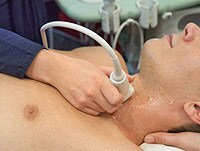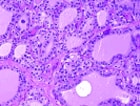Long-term antithyroid drug treatment is useful for children with Graves' disease, with low risk of adverse events and remission achievable in nearly half of patients, according to the findings of a new retrospective single-center study from Japan, published online in the February issue of Thyroid.
Furthermore, the number of remissions increases with the duration of antithyroid drug treatment up to 5 years, say Hidemi Ohye, MD, PhD, from Ito Hospital, Tokyo, Japan, and colleagues in their paper.
They stress, however, that one antithyroid drug in particular, methimazole, is preferable to the other option, propylthiouracil, for long-term treatment in pediatric patients, because the latter is associated with serious adverse events. This advice is in line with a recent recommendation from the American Thyroid Association (ATA) and the American Association of Clinical Endocrinologists (AACE), which both strongly recommend that methimazole should be used to treat Graves' disease in children, they note.
Asked to comment for Medscape Medical News, Andrew J. Bauer, MD, director of the thyroid center at the Children's Hospital of Philadelphia, Pennsylvania, said: "[This study] confirms that antithyroid drug use should be considered first-line therapy for pediatric patients with Graves' disease, that with appropriate dosing and surveillance the risk of adverse events is low and does not increase with increasing length of therapy, and that remission may be achievable in approximately 45% to 50% of patients.
"However, the study reminds us that relapse is common and that the timing and decision to move toward definitive therapy [thyroidectomy and radioactive iodine treatment] must be individualized," added Dr. Bauer, who was not involved with the study.
Management of Graves' Disease in Children "a Dilemma"
Although very rare, Graves' disease is the most common cause of hyperthyroidism in the developed world and is caused by an immune defect in genetically susceptible individuals.
"The management of [Graves' disease] in children is associated with a dilemma," say Dr. Ohye and colleagues in their paper. Although the established initial treatment is antithyroid drug therapy, the remission rate in children has previously been thought to be lower than in adults (30% compared with 50%), and severe adverse events from one antithyroid drug in particular, propylthiouracil, are an issue, they explain.
And definitive treatments for Graves' disease — thyroidectomy and radioactive iodine therapy — are effective, but they often result in permanent hypothyroidism and the need for lifelong T4 supplementation.
So, in their study, the researchers set out to examine the outcome of antithyroid drug treatment, to try to identify significant predictors of remission and to assess the adverse events associated with drug therapy in a large population of children with the disease.
They retrospectively assessed 1138 children (995 girls and 143 boys) aged 18 years and under who had been newly diagnosed with Graves' disease at their institution, Japan's most well-known thyroid referral center, between 1982 and 2006.
Median age at diagnosis was 16 years (range, 3 – 18 years), and all patients were initially treated with an antithyroid drug. Of the 1138 children assessed, 723 continued on antithyroid drugs, 218 had thyroid surgery, 53 had radioactive iodine treatment, and 144 discontinued therapy. (The researchers note that, in Japan, radioactive iodine treatment is not generally recommended for those under 18.)
A "Model" for Optimizing Care of Graves' Disease in Children
Of the 723 patients who continued drug therapy, 84 subsequently continued it and 639 stopped, 334 of whom did so because they were in remission, defined as maintenance of euthyroidism for more than 12 months after discontinuing treatment and no relapses during follow-up.
Relapse occurred in 247 patients who discontinued antithyroid drug, mostly within 2 years of stopping therapy, and for this reason, the investigators recommend continued surveillance for at least 2 years after discontinuation of antithyroid drug treatment.
Median duration of treatment was 3.8 years (range, 0.3 – 24.8 years) and 58 patients were lost to follow-up.
The cumulative remission rate increased with the duration of antithyroid drug therapy up to 5 years, an important finding because the ATA recommends thyroidectomy or radioactive iodine therapy for children if a remission is not achieved after 1 to 2 years of drug therapy (with methimazole).


